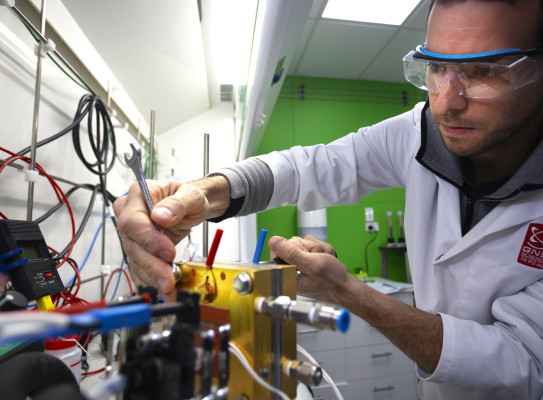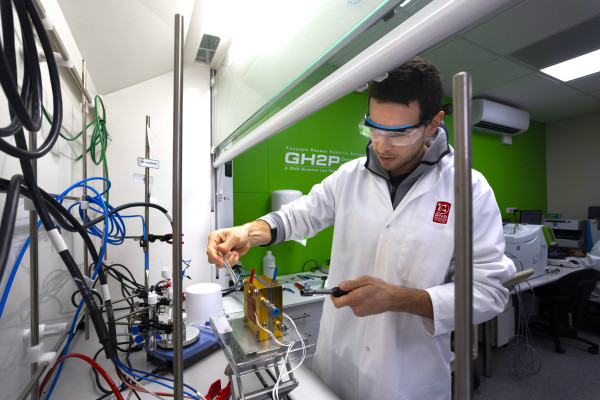Meeting the market with PowerMatch and other hydrogen technology

GNS Scientists are advancing technologies to drive down the cost of green hydrogen.
Our innovations are helping position New Zealand as a global leader in affordable, green hydrogen solutions.
Making green hydrogen economically viable
Cost reduction is pivotal to make green hydrogen commercially viable. The largest single cost driver of green hydrogen is the power consumption required for its production. In today’s market, electricity makes up approximately 70% of the total cost of green hydrogen, followed by the system’s capital cost of around 17%. Seeking solutions to the power problem is fundamental to lowering its operational costs and establishing it as a competitive fuel alternative.
The most energy demanding step for green hydrogen production is splitting water into oxygen gas. This process, called water electrolysis, is performed by an electrolyser. Current electrolysers on the commercial market require iridium-based catalysts composed of costly and rare materials.
Using an advanced particle accelerator
GNS scientists are producing next-generation catalysts to reduce material costs. They have also discovered a new type of magnetism that improves an industry gold standard catalyst.
As well as developing more energy-efficient and cost-effective materials, GNS scientists are investigating the operational mechanics of electrolysers. They’re seeking to lower the electrical energy they need and to extend the life of the rare materials within them.
Awarded Tier 2 KiwiNet funding
Recently approved by the KiwiNet Investment Committee for funding, GNS’ "PowerMatch" technology is a promising innovation. The PowerMatch system is designed to optimise the amount of electrical energy needed to produce green hydrogen. In addition to reducing operational costs, PowerMatch could also help slow the degradation of catalyst materials.
The team is developing the technology so that it can be both retrofitted to existing plants and added to new plants
"It’s important we can help everyone in the market address the operational costs of green hydrogen”, said Campbell Barnes, PowerMatch Commercial Lead at GNS Science.

We are also advancing green ammonia
As well as addressing production costs, the team is pioneering advancements in hydrogen storage and distribution through ammonia-based solutions, including demonstrating the first electrochemical production of ammonia in New Zealand. This breakthrough not only supports energy storage solutions but also contributes to reducing the overall cost of green hydrogen by making energy storage more feasible and cost-effective.
We will be working on a new frontier for green ammonia in New Zealand thanks to the 2024 Endeavour Fund where we will be developing novel electrocatalytic systems to overcome the key barriers in achieving decarbonised, decentralised ammonia production. This will enable New Zealand to produce low-carbon, transportable energy storage and "green" fertilisers.